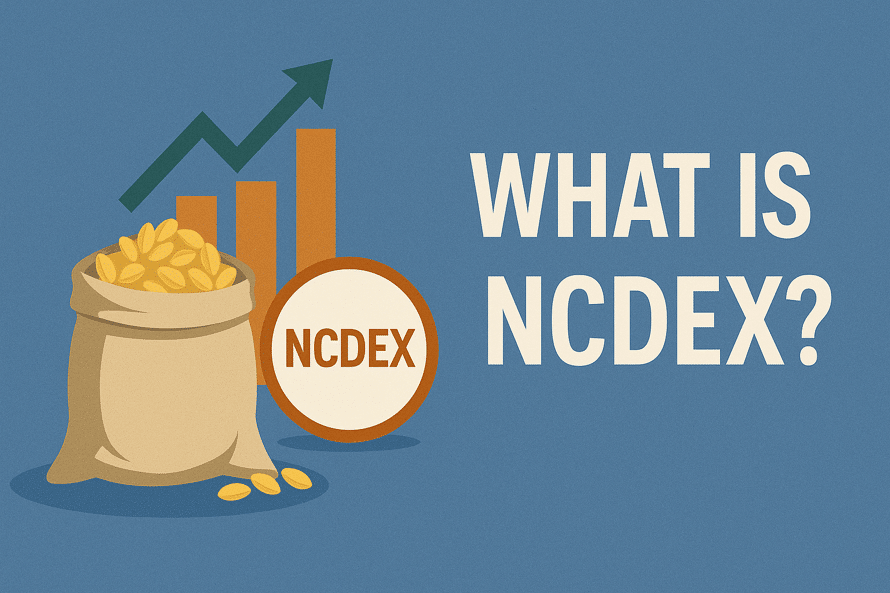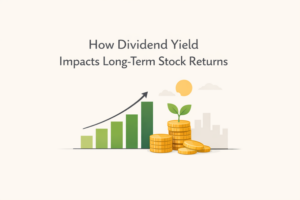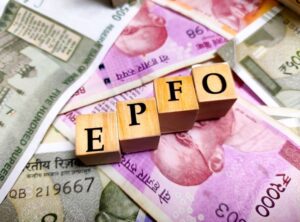What is NCDEX: Understanding how the exchange functions

The National Commodity and Derivatives Exchange Limited (NCDEX) is a large online market for buying and selling commodities in India. Incorporated in 2003, its operations are overseen by the Securities and Exchange Board of India (SEBI). The platform provides a market where traders and investors can buy and sell commodities and helps manage price risks effectively. Let’s take a deep dive to learn: What is NCDEX?
History and evolution of NCDEX
The National Commodity & Derivatives Exchange was established on 23rd April 2003 and opened for trading on 15th December. NSE, ICICI Bank, CRISIL, NABARD, and LIC formed NCDEX. The platform only operates using digital technology and electronic processes. Individuals inquiring about “What is NCDEX?” are often introduced to a regulated exchange for agricultural commodities in India.
Since its inception, NCDEX has increased the variety of products targeted to facilitate fair price determination and efficient risk management. Farmers, traders, and investors trade various agricultural commodities on the platform. The exchange has greatly improved its operations by adding futures, options, and indices to enhance the turnover efficiency. Transparency has improved, fair prices are ensured, and NCDEX prices are often quoted as a benchmark around the globe.
Commodities traded on the NCDEX
The NCDEX mainly concerns agricultural commodities: spices, pulses, oilseeds, and other products. Some major commodities traded over NCDEX are wheat, maize, coriander, turmeric, mustard seed, and chana.
Besides cotton and sugar, guar seed, guar gum, castor seed, and mustard seed are among the most traded commodities. By trading in such commodities, farmers and traders can better control price fluctuations and reduce risk exposure.
How NCDEX works
NCDEX allows buying and selling of agricultural commodities like wheat, rice, and spices. It performs the same function as a stock exchange, with commodities traded. It provides a protective tool to farmers, traders, and corporations against fluctuations in commodity prices. Trading between purchasers and sellers is achieved by using futures contracts.
Futures contracts hedge the price of a product to be delivered on an agreed-upon date. This reduces sudden price volatility and safeguards stakeholders from financial losses. Market regulator SEBI supervises NCDEX to ensure the safety and fairness of the trade.
NCDEX Trading Instruments
Trading in commodities on NCDEX is possible through futures and options markets. Futures contracts are primarily used to trade agricultural-related commodities, and only specific commodities permit the trading of options. Additionally, the NCDEX provides an index that shows the movements of prices of the 10 agricultural commodities.
Commodities are weighted the same in this index, and their spot prices are tracked. Spot price refers to the immediate value of a commodity that is immediately tradable. A futures price, on the other hand, indicates the market’s anticipation of the value of the commodity in the future.
NCDEX vs. MCX: Key differences
To understand NCDEX, you must know how it differs from the other major exchange, MCX. Awareness of key differences makes it possible to select the best exchange for your trading needs.
• Commodity Focus
The metals and energy sectors dominate MCX, with most transactions. MCX traders regularly appear in the gold, silver, copper, aluminum, crude oil, and natural gas markets. It also offers agricultural commodities. On the contrary, NCDEX mainly trades agricultural commodities such as soybeans, chana, wheat, and turmeric.
• Product Offerings
MCX offers an extensive menu of contract options. MCX’s offerings include industrial metals, energy, and various financial derivatives. It provides an investment opportunity for those looking for alternatives beyond agricultural markets. The key products at NCDEX are futures and options for farm commodities. The exchange contributes to agricultural development by facilitating transactions in essential crops.
• Market Segments and Participants
Both large investors and individual traders are represented on MCX. Businesses in the energy and metals industries utilize it extensively. NCDEX primarily serves the farming community. Farmers, cooperatives, and agri-traders use it to generate revenue and safeguard themselves against price fluctuations.
How to trade on NCDEX?
Now that you know what is NCDEX, you would be eager to learn how to trade on the exchange. Well, NCDEX allows you to purchase and sell agricultural products. Here is how you can trade on NCDEX:
- Open a commodity trading account with a reliable and recognized broker in NCDEX.
- Connect your trading account to your Demat account.
- Ensure your trading account balance meets the minimum requirement for starting commodity trades.
- When you have opened your account and loaded it with funds, you are set to begin trading in commodities.
Regulations & governance of NCDEX
SEBI regulates the National Commodity and Derivatives Exchange in compliance with the Commodity Derivatives Market Regulation.
SEBI’s regulations ensure that all pricing within the exchange is fair and well-balanced. Such steps provide an efficient and simple way to trade and settle derivatives. All contracts exchanged on the NCDEX have a set standard volume, making trading less stressful and easier.
NCDEX’s financial performance
NCDEX recorded a higher net loss during Q3FY25 than it did in Q3FY24. In Q3FY25, the company reported a net loss of ₹11.61 crore, higher than the ₹10.91 crore loss seen in Q3FY24. However, net loss declined sequentially, as NCDEX posted a net loss of ₹15.04 crore in the quarter ended September 2024.
Operations revenue dropped by 4.93% year over year, with ₹21.59 crore earned during Q3FY25 compared to ₹22.71 crore earned in Q3FY24. By comparison, revenue for the current quarter grew by 10.6% and went up to ₹21.59 crore from ₹19.52 crore in the September 2024 quarter. Ongoing trends suggest the commodity market’s nominal value will be US$1.61tn in 2025.
Advantages & challenges of NCDEX
NCDEX is a credible trading marketplace for agricultural and other commodities. Here are some of its advantages and challenges.
Advantages
- Futures contracts provide farmers and traders a way to protect themselves against price fluctuations. Every transaction in NCDEX is open to all, meaning users can make informed decisions, encouraging open competition.
- Investors can reduce inherent stock market risks by including commodities such as crops and metals in their investments. The platform is web-based, which means that traders and investors throughout India can trade from their mobiles or computers.
- NCDEX’s compliance with SEBI rules ensures investor safety and legality of all trading activities. Understanding NCDEX allows safe and transparent commodity trade, which helps investors reduce their risks and expand their financial options.
Challenges
However, NCDEX investment also comes with its share of challenges.
- Market volatility is one of the main investor concerns as prices fluctuate due to climate, geopolitical situations, or other external economic events.
- Price fluctuations may result in losses to traders. Changes in supply and demand can greatly alter grid courses in agricultural commodities.
- Inflationary price volatility may be induced by adverse weather or harvest failure.
- To reduce these risks, investors should introduce stop-loss orders. This helps limit potential losses.
Keeping one’s eye on market trends is essential. These risks can be managed through informed decisions and strategic trades to achieve profitable returns on NCDEX.
Future of NCDEX and recent developments
NCDEX’s prospects look bright as agricultural trading gains momentum in India. Under the government’s guidance, retail investors are gaining more knowledge in this market. Creating new products and tools promotes the ease of trading on NCDEX. Digital technologies and methods of algorithmic trading are also facilitating NCDEX’s growth.
These efforts make NCDEX easier to use and more effective. For those who are aware of what is NCDEX, understanding this major market for agriculture commodities trading is important.
Conclusion
NCDEX plays a very important role in India’s agriculture sector. It opens a reliable marketplace for the exchange of commodity goods. Price discovery and risk management are important advantages for farmers, traders, and investors.
Understanding what is NCDEX helps to appreciate the importance of the platform to the commodities market. It helps develop the rural economy and deters unfair trading practices. NCDEX remains the main enabler for stakeholders, contributing to the secure and regulated expansion of commodity trading in India.
FAQs
What is the full form of NCDEX?
NCDEX is short for National Commodity and Derivatives Exchange Limited. Through futures trading, traders can transact in agriculture and various other commodities on NCDEX.
How is NCDEX different from MCX?
NCDEX deals mainly with trading in agricultural commodities. MCX specializes in commodities like gold, silver, and crude oil, which are categorized under metals and energy. Each acts as a commodity exchange but focuses on different sectors.
Can retail investors trade on NCDEX?
Retail investors can also trade through the NCDEX. To start trading on NCDEX, retail investors need to open a trading account with a certified broker and then trade futures contracts of commodities.
Which are the most traded commodities on NCDEX?
NCDEX’s most traded commodities are guar seed, soybean, chana, castor seed, and jeera. These agricultural products have distinct market behavior and price volatility.
Is NCDEX regulated by SEBI?
SEBI regulates the activities of the NCDEX. The market regulator monitors and controls significant exchanges to protect investors.
Disclaimer
The stocks mentioned in this article are not recommendations. Please conduct your own research and due diligence before investing. Investment in securities market are subject to market risks, read all the related documents carefully before investing. Please read the Risk Disclosure documents carefully before investing in Equity Shares, Derivatives, Mutual fund, and/or other instruments traded on the Stock Exchanges. As investments are subject to market risks and price fluctuation risk, there is no assurance or guarantee that the investment objectives shall be achieved. Lemonn (Formerly known as NU Investors Technologies Pvt. Ltd) do not guarantee any assured returns on any investments. Past performance of securities/instruments is not indicative of their future performance.







